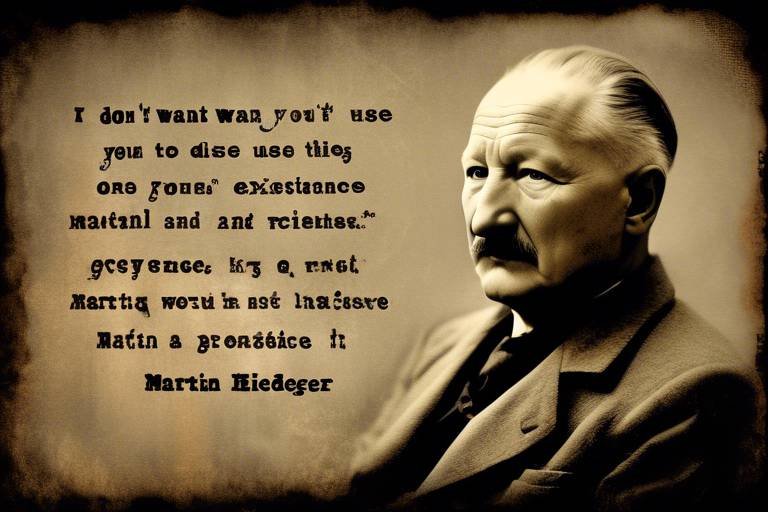The Impact of Immanuel Kant's Categorical Imperative
The Categorical Imperative, introduced by the renowned philosopher Immanuel Kant, is a cornerstone of moral philosophy that continues to resonate through the ages. Imagine standing at a crossroads, where every decision you make could ripple through the fabric of society, influencing the lives of countless individuals. This is the essence of Kant's moral framework—a call to recognize our duties not just to ourselves, but to humanity as a whole. The significance of the Categorical Imperative lies in its ability to provide a universal standard for evaluating moral actions, urging us to consider whether our choices could be adopted as a universal law.
At its core, the Categorical Imperative emphasizes the intrinsic value of human beings, advocating for actions that respect the dignity of all. This moral principle acts as a guiding star, illuminating the path of ethical decision-making in a world often clouded by ambiguity and self-interest. By promoting the idea that we should act only according to maxims that could be willed as universal laws, Kant challenges us to rise above personal desires and consider the broader implications of our actions.
Moreover, the impact of the Categorical Imperative extends beyond philosophical discourse; it has profound implications in various fields such as law, politics, and bioethics. For instance, legal systems that prioritize justice and fairness often draw upon Kantian principles, ensuring that laws are crafted with a sense of moral duty. Similarly, in the realm of bioethics, the Categorical Imperative guides healthcare professionals in making decisions that honor patient autonomy and human dignity.
As we navigate complex moral landscapes in contemporary society, Kant's ideas remind us that our choices matter. They compel us to reflect on our responsibilities to others and to uphold a moral code that transcends personal gain. In this sense, the Categorical Imperative is not just a theoretical construct; it is a practical tool that empowers us to engage with the world in a more ethical and compassionate way.
In the following sections, we will delve deeper into the fundamental principles of the Categorical Imperative, explore its formulations, and examine its critiques and modern applications. By understanding Kant's moral philosophy, we can better appreciate its lasting influence and relevance in today's ethical discussions.
- What is the Categorical Imperative? The Categorical Imperative is a moral principle developed by Immanuel Kant that emphasizes acting according to maxims that can be universally applied.
- How does the Categorical Imperative differ from hypothetical imperatives? Unlike hypothetical imperatives, which are conditional and depend on personal desires, the Categorical Imperative is unconditional and applies universally.
- Can the Categorical Imperative be applied in modern ethical dilemmas? Yes, the Categorical Imperative continues to influence contemporary ethical discussions in various fields, including law, politics, and bioethics.

Understanding the Categorical Imperative
The Categorical Imperative is not just a fancy term tossed around in philosophical circles; it is the cornerstone of Immanuel Kant's moral philosophy. Imagine a compass guiding us through the tangled forest of ethical dilemmas—this is what the Categorical Imperative does for us. It lays down a set of rules that are meant to be universally applicable, highlighting the importance of duty and moral law over personal inclinations or the consequences of our actions. In simpler terms, Kant believed that there are certain moral truths that apply to everyone, regardless of the situation. This principle is what makes the Categorical Imperative so compelling and, at times, controversial.
Kant proposed that our actions should be guided by maxims that can be willed into universal law. This means that before we act, we should ask ourselves: "What if everyone acted this way?" If the answer leads to a contradiction or an undesirable world, then that action is deemed immoral. This is a radical shift from consequentialist theories that focus on the outcomes of actions. Instead of asking, "What will happen if I do this?" we ask, "Is this action something everyone should be able to do?"
To further clarify this concept, let's break down the Categorical Imperative into its essential components. The first is the idea of duty. Kant argues that moral actions arise from a sense of obligation rather than from a desire for personal gain or fear of punishment. This sense of duty is what drives us to act morally, even when it may not be in our best interest. The second component is the notion of universality, which insists that our moral laws should apply to all rational beings equally. This universality is crucial in ensuring that we treat everyone with the respect and dignity they deserve.
Now, you might be wondering how this all fits into our everyday lives. Well, consider the following scenarios:
- If you think it's acceptable to lie to get out of a tough situation, ask yourself: "What if everyone lied whenever it was convenient?" The world would be chaotic and trust would evaporate.
- If you believe in helping others in need, reflect on whether you would be comfortable if everyone acted in the same way. The answer is likely a resounding yes, reinforcing the moral weight of your action.
In essence, the Categorical Imperative serves as a moral litmus test for our actions. It challenges us to rise above our biases and consider the broader implications of our behavior. By adhering to this principle, we not only cultivate a sense of moral integrity but also contribute to a more just and equitable society.

The Role of Duty in Kantian Ethics
The concept of duty is at the heart of Kantian ethics, serving as a cornerstone for understanding moral actions. Unlike many ethical frameworks that prioritize the outcomes of actions, Kant argues that the rightness or wrongness of an action is determined by the intention behind it. This means that when we act out of a sense of duty, we are aligning ourselves with a universal moral law that transcends personal desires and societal norms. Imagine a world where everyone acted purely based on their whims; chaos would ensue. Kant's philosophy offers a structured approach to morality, ensuring that our actions contribute to a more just society.
At the core of Kant's moral philosophy is the idea that all individuals possess an inherent sense of duty, which compels them to act in accordance with moral laws. This sense of duty is not merely a social construct or a reflection of cultural norms; it is a fundamental aspect of human reason. When we recognize our duty, we acknowledge a moral obligation that demands respect and adherence. For instance, consider a scenario where a person finds a lost wallet. The sense of duty compels them to return it to its rightful owner, not because they expect a reward, but because it is the morally correct action to take. This illustrates how Kantian ethics prioritizes moral duty over personal gain.
Furthermore, Kant's emphasis on duty leads to the development of moral principles that are universal and applicable to all rational beings. He posits that moral laws should be formulated in such a way that they can be willed as universal laws. This is where the concept of moral universality comes into play. When faced with a moral dilemma, individuals should ask themselves, "Would I want everyone to act in the same way?" If the answer is no, then the action is deemed morally impermissible. This approach not only fosters consistency in ethical behavior but also promotes a sense of responsibility towards others.
In Kantian ethics, duty is not merely about following rules; it is about recognizing the inherent value of individuals and treating them with respect. This respect stems from the understanding that every person has the capacity for rational thought and moral decision-making. Thus, when we act out of duty, we affirm the dignity of others and acknowledge their right to make choices. This perspective is especially relevant in today's society, where the balance between individual rights and collective responsibilities is often contested. By grounding our actions in duty, we can navigate complex moral landscapes with clarity and purpose.
In summary, the role of duty in Kantian ethics is pivotal. It shapes our moral compass, guiding us to act not just in our self-interest, but in a way that upholds universal moral laws. By understanding and embracing our duties, we contribute to a moral framework that values human dignity and promotes ethical behavior across all aspects of life.
- What is the primary focus of Kantian ethics?
Kantian ethics primarily focuses on the concept of duty and the intention behind actions rather than the consequences. - How does duty influence moral decision-making?
Duty serves as a guiding principle that compels individuals to act in accordance with universal moral laws, ensuring that actions are morally sound. - Can duty conflict with personal desires?
Yes, in Kantian ethics, personal desires may conflict with duty, but moral actions should prioritize duty over personal gain. - What is the significance of moral universality in Kant's philosophy?
Moral universality ensures that moral laws apply to all rational beings, promoting consistency and fairness in ethical decision-making.

Formulations of the Categorical Imperative
The Categorical Imperative is not just a single principle; it comprises several formulations that together create a robust framework for moral reasoning. Immanuel Kant, the brilliant mind behind this concept, articulated these formulations to address the complexities of ethical decision-making. Each formulation serves as a lens through which we can view our actions and their moral implications, guiding us toward a more principled life. By emphasizing the universality of moral laws, Kant aimed to establish a foundation for ethics that transcends personal biases and situational contexts.
One of the most significant formulations is the Formula of Universal Law, which posits that we should act only according to that maxim by which we can at the same time will that it should become a universal law. In simpler terms, this means that before taking any action, we should ask ourselves: "What if everyone acted this way?" If the action can be universalized without contradiction, then it is morally permissible. This formulation encourages consistency in ethical behavior and helps to eliminate double standards, making it a cornerstone of Kantian ethics.
Another crucial formulation is the Formula of Humanity, which asserts that we must treat humanity, whether in our own person or in the person of any other, always at the same time as an end and never merely as a means to an end. This principle emphasizes the intrinsic value of every individual, advocating for respect and dignity in our interactions. By recognizing the worth of each person, we are compelled to consider their rights and needs in our moral deliberations, fostering a more compassionate society.
To further illustrate the interconnections among these formulations, let's take a look at how they complement each other:
| Formulation | Key Principle | Ethical Implication |
|---|---|---|
| Formula of Universal Law | Act only on maxims that can be universalized | Promotes consistency and fairness in moral actions |
| Formula of Humanity | Treat individuals as ends in themselves | Encourages respect for human dignity and rights |
These formulations are not isolated; they work together to create a comprehensive ethical system that prioritizes both duty and respect for individuals. Kant believed that by adhering to these principles, we could navigate the moral landscape with greater clarity and integrity. It's fascinating to see how these ideas, rooted in the 18th century, continue to resonate in today's ethical discussions, influencing how we approach moral dilemmas in various fields such as law, politics, and personal relationships.

The Formula of Universal Law
The Formula of Universal Law stands as one of the most pivotal aspects of Immanuel Kant's Categorical Imperative. At its core, this principle asserts that one should act only according to that maxim which one can, at the same time, will that it should become a universal law. Sounds a bit complex, right? But let's break it down. Imagine if every action you took became a universal rule that everyone had to follow. Would you still make that choice? This thought experiment is what Kant encourages us to engage in to assess the morality of our actions.
To illustrate, consider the act of lying. If lying were to become a universal law, then the very concept of truth would disintegrate. In a world where everyone lies, no one would trust anyone, rendering communication futile. Thus, according to the Formula of Universal Law, lying fails the test of universality and is deemed morally unacceptable. This is where Kant’s philosophy shines, urging individuals to think beyond immediate consequences and instead focus on the broader implications of their actions.
Kant's emphasis on universality encourages consistency in moral reasoning. It compels us to ask ourselves: "Would I want everyone to act this way?" This reflective process not only guides personal conduct but also fosters a sense of accountability. By adhering to this principle, individuals cultivate a moral compass that transcends personal biases and situational ethics. In this light, the Formula of Universal Law serves as a robust framework for ethical decision-making, promoting actions that can be universally accepted without contradiction.
Moreover, the implications of this formula extend beyond individual actions. They resonate within societal structures and legal systems. When laws are created, they should ideally stem from principles that can be universally applied. For instance, laws against theft or violence are grounded in the understanding that if everyone were to steal or harm, society would collapse. Therefore, the universality of such laws aligns with Kant's ethical framework, reinforcing justice and fairness in human interactions.
In summary, the Formula of Universal Law is not just a theoretical construct; it is a practical guide that challenges us to live by principles that can withstand the test of universality. By engaging with this concept, we cultivate a deeper understanding of our moral responsibilities and the impact of our choices on the world around us. As we navigate the complexities of modern life, Kant's call for universal moral laws remains a beacon for ethical conduct, guiding us toward a more just and equitable society.

The Formula of Humanity
The Formula of Humanity is one of the most compelling aspects of Immanuel Kant's Categorical Imperative, emphasizing the intrinsic value of human beings. Kant asserts that we should treat others not merely as means to an end, but as ends in themselves. This principle serves as a foundational pillar in ethical decision-making, highlighting the importance of respecting individual dignity and autonomy. Imagine walking into a bustling marketplace; each person you encounter is not just a faceless shopper but a unique individual with their own aspirations, fears, and rights. This perspective challenges us to engage with others on a deeper level, recognizing their humanity in every interaction.
At its core, the Formula of Humanity calls for a moral framework that prioritizes respect for individuals. It encourages us to consider how our actions affect others and to act in ways that honor their inherent worth. For instance, when making decisions in business, it’s crucial to think about how those decisions impact employees, customers, and the broader community. Are we treating them as mere tools for profit, or are we acknowledging their full humanity? This ethical lens not only fosters a more compassionate society but also cultivates trust and cooperation among individuals.
Kant's emphasis on humanity extends beyond mere acknowledgment; it demands active engagement. This means advocating for the rights of others, ensuring that their voices are heard, and standing against injustices that dehumanize individuals. In practice, this could manifest in various ways, such as supporting policies that protect marginalized communities or engaging in volunteer work that uplifts those in need. The Formula of Humanity challenges us to be proactive in our moral responsibilities, pushing us to create a world where everyone is valued and respected.
Moreover, the implications of the Formula of Humanity can be seen in various contemporary ethical discussions. For example, in the realm of bioethics, healthcare professionals are often faced with dilemmas that require them to balance patient autonomy with medical guidelines. Here, the Formula of Humanity plays a crucial role, guiding practitioners to respect patients' rights to make informed decisions about their own bodies. This respect for autonomy aligns with Kant’s vision of treating individuals as ends in themselves, ensuring that their dignity is upheld in every medical interaction.
In conclusion, the Formula of Humanity is not just a philosophical concept; it is a call to action. It invites us to reflect on our moral choices and to strive for a society where every individual is treated with the respect and dignity they deserve. By embracing this principle, we can foster a more ethical world, one that recognizes and celebrates the humanity in each of us.
- What is the Formula of Humanity?
The Formula of Humanity is a principle from Kant's Categorical Imperative that emphasizes treating individuals as ends in themselves, respecting their inherent dignity and rights.
- How does the Formula of Humanity apply in everyday life?
It applies by encouraging us to consider the impact of our actions on others, advocating for their rights, and treating them with respect and dignity in all interactions.
- Why is the Formula of Humanity important in bioethics?
In bioethics, it guides healthcare professionals to respect patient autonomy and make ethical decisions that honor the dignity of individuals in medical contexts.

Critiques of the Categorical Imperative
The Categorical Imperative, while groundbreaking in its approach to ethics, has not escaped scrutiny. Critics argue that its strict adherence to duty can lead to morally questionable outcomes. Imagine a world where every action is dictated solely by duty; it might sound noble, but the reality could be quite grim. For instance, what happens when a moral duty conflicts with the consequences of an action? This is where many philosophers find fault with Kant's framework. They argue that it lacks the flexibility needed to navigate the complexities of real-life situations.
One significant critique is that the Categorical Imperative is overly rigid. Kant’s insistence on universalizing moral laws may disregard individual circumstances and the nuances of human experience. Critics suggest that morality is often situational, and a one-size-fits-all approach can lead to outcomes that seem unjust or impractical. For example, consider the classic trolley problem: should one pull a lever to divert a runaway trolley onto a track where it will kill one person instead of five? A strict Kantian approach might reject this action outright, prioritizing the duty not to harm an individual, even if it means allowing greater harm to occur. This rigidity raises questions about the applicability of Kant's ethics in urgent, life-and-death scenarios.
Moreover, some argue that Kant’s focus on duty can lead to moral dilemmas that seem absurd. If one were to encounter a friend hiding from a murderer, the Categorical Imperative might compel you to tell the truth about their whereabouts, as lying would violate a moral law. Yet, intuitively, most people would feel that lying in this case is the morally right choice. This highlights a potential disconnect between Kantian ethics and common moral intuitions.
Another criticism centers around the notion of human rationality. Kant’s philosophy assumes that all individuals are rational beings capable of understanding and applying universal moral laws. However, critics point out that not everyone possesses the same level of rationality or moral insight. This raises concerns about inclusivity in moral reasoning and whether Kant's framework can adequately address the ethical needs of diverse populations.
In light of these critiques, it’s essential to consider how Kant's ideas can be adapted or supplemented to address their shortcomings. While the Categorical Imperative provides a strong foundation for moral philosophy, integrating a more flexible approach that considers consequences and human emotions may lead to a more holistic understanding of ethics. The ongoing debate surrounding these critiques not only enriches philosophical discourse but also underscores the complexity of moral decision-making in our lives.
- What is the Categorical Imperative?
The Categorical Imperative is a key concept in Immanuel Kant's moral philosophy that emphasizes duty and universal moral laws. - Why is the Categorical Imperative criticized?
Critics argue that it is too rigid, overlooks individual circumstances, and may lead to morally questionable outcomes. - How does the Categorical Imperative apply to modern ethics?
Kant's ideas influence contemporary discussions in various fields, including law and bioethics, by emphasizing justice and human dignity.

The Categorical Imperative in Modern Ethics
The relevance of Immanuel Kant's Categorical Imperative in today's ethical discussions cannot be overstated. In a world where moral dilemmas frequently arise, Kant's principles provide a robust framework for navigating complex situations. This is particularly evident in various fields, such as law, politics, and bioethics, where moral clarity is essential. By focusing on universal moral laws and the intrinsic worth of individuals, the Categorical Imperative serves as a compass for ethical decision-making. But how does this ancient philosophy apply to our modern dilemmas? Let's dive deeper.
In the realm of law, the Categorical Imperative has profoundly influenced the development of legal theories that prioritize justice and fairness. For instance, legal systems often strive to uphold principles that are universally applicable, echoing Kant's idea that one should act only according to that maxim which one can will to become a universal law. This means that laws should not be arbitrary but should apply equally to all individuals, ensuring that justice is not just a concept but a lived reality. The implications of this are vast, as it encourages lawmakers to consider the broader impact of their decisions on society.
Moreover, the Categorical Imperative's emphasis on human dignity has made a significant impact in the field of bioethics. In healthcare and medical research, the principle of treating individuals as ends in themselves is paramount. This means that patients should never be viewed merely as means to an end or as subjects for experimentation without their consent. Instead, their autonomy and dignity must be respected at all times. This approach has led to the establishment of ethical guidelines that prioritize informed consent and respect for patient autonomy, transforming how medical professionals interact with patients.
As we continue to grapple with ethical questions in various domains, the Categorical Imperative remains a guiding light. It not only challenges us to think critically about our actions but also compels us to consider the implications of those actions on others. The principles underpinning Kant's philosophy can be summarized as follows:
| Principle | Description |
|---|---|
| Universalizability | Actions should be applicable to everyone, promoting fairness and consistency. |
| Human Dignity | Individuals must be treated as ends in themselves, respecting their autonomy. |
| Duty Over Consequence | Moral actions are determined by duty, not by the outcomes they produce. |
This table highlights the core principles that guide ethical reasoning in various contexts today. As we navigate through modern challenges, these principles encourage us to maintain a moral compass that is rooted in respect and fairness. Whether it's in crafting laws that serve the public good or making ethical choices in healthcare, Kant's Categorical Imperative provides a timeless foundation for moral philosophy.
- What is the Categorical Imperative?
The Categorical Imperative is a central concept in Kant's moral philosophy that emphasizes duty and universal moral laws. - How does the Categorical Imperative apply to modern ethics?
It influences various fields, including law and bioethics, by promoting justice, fairness, and respect for human dignity. - Why is duty prioritized over consequences in Kantian ethics?
Kant believed that moral actions should stem from a sense of obligation rather than the results they yield.

Application in Legal Frameworks
The principles of the Categorical Imperative have made significant inroads into the realm of legal frameworks, fundamentally altering how justice and fairness are perceived and applied in society. Kant's assertion that moral actions should be guided by duty rather than consequences resonates deeply within the legal system, where the pursuit of justice is paramount. In essence, laws are not merely a set of rules to avoid punishment; they embody a moral commitment to uphold the dignity of individuals and the collective good.
One of the core tenets of Kant's philosophy is that actions must be universally applicable, which aligns closely with the legal principle of equality before the law. This principle asserts that all individuals, regardless of their background, should be treated equally in the eyes of the law. For instance, consider how laws governing theft apply uniformly to everyone. Whether a person is wealthy or impoverished, the act of stealing is judged against the same legal standards, reflecting the Categorical Imperative's call for universalizability. This creates a framework where justice is not just a privilege for the few but a right for all.
Moreover, Kant's emphasis on treating individuals as ends in themselves rather than means to an end has profound implications for legal ethics. In practice, this means that laws should not only serve the interests of the state or society but must also respect and protect the rights and dignity of every individual. This can be seen in legal protections against discrimination, where laws are designed to ensure that every person is valued and treated with respect, regardless of race, gender, or socioeconomic status.
To illustrate the impact of the Categorical Imperative on legal frameworks, let's consider a few key areas:
| Legal Area | Application of Categorical Imperative |
|---|---|
| Criminal Law | Ensures that all individuals are treated equally under the law, regardless of their status. |
| Human Rights Law | Protects individual rights and freedoms, emphasizing respect for human dignity. |
| Contract Law | Requires that agreements are made with mutual respect and understanding, upholding the dignity of all parties involved. |
In summary, the application of the Categorical Imperative in legal frameworks is not just about adhering to laws; it’s about fostering a legal culture that prioritizes moral duty and the inherent worth of each individual. By integrating Kantian ethics into the fabric of law, societies can aspire to create a more just and equitable world, where every person is recognized as an end in themselves, deserving of respect and dignity.
- What is the Categorical Imperative? The Categorical Imperative is a foundational concept in Kant's moral philosophy, emphasizing that actions should be universally applicable and respect the dignity of individuals.
- How does the Categorical Imperative influence modern law? It promotes the idea of equality before the law and emphasizes the protection of individual rights and dignity.
- Can the Categorical Imperative be applied to all legal situations? While it provides a strong ethical foundation, its application may vary depending on specific legal contexts and interpretations.

Influence on Bioethics
The realm of bioethics is a fascinating intersection of medicine, law, and moral philosophy, where the principles of the Categorical Imperative shine brightly. Immanuel Kant's emphasis on autonomy and human dignity provides a robust framework for navigating the complex ethical dilemmas faced in healthcare and medical research today. At the heart of Kantian ethics is the idea that individuals must be treated as ends in themselves, not merely as means to an end. This principle is particularly crucial in bioethical discussions, where the stakes often involve the very essence of human life and well-being.
In practice, this means that healthcare professionals and researchers are called to respect the autonomy of patients and research subjects. For instance, obtaining informed consent is not just a legal requirement; it is a moral obligation rooted in Kantian ethics. Patients must be fully informed about their treatment options and the potential risks involved, allowing them to make autonomous decisions about their own health. This respect for autonomy is a direct reflection of the Categorical Imperative's insistence on treating individuals with dignity.
Moreover, the Categorical Imperative challenges us to consider the broader implications of our actions. In bioethics, this translates into a call for justice and fairness in the distribution of healthcare resources. For example, when allocating limited medical resources, such as organ transplants or experimental treatments, the principles of universalizability and respect for persons demand that decisions be made impartially and equitably. This means that policies should be developed that can be universally applied, ensuring that no group is unfairly disadvantaged.
To illustrate this point further, consider the following table that outlines key Kantian principles and their applications in bioethics:
| Kantian Principle | Application in Bioethics |
|---|---|
| Autonomy | Informed consent in medical procedures and research |
| Human Dignity | Respecting patients' rights and preferences |
| Universalizability | Equitable resource allocation in healthcare |
| Treating Individuals as Ends | Prioritizing patient welfare over profit motives |
Additionally, Kant's framework encourages a reflective approach to ethical decision-making. Healthcare providers are urged to engage in a process of moral reasoning that considers not only the immediate consequences of their actions but also the broader ethical implications. This reflective practice fosters a culture of accountability and ethical integrity within the medical community, ensuring that decisions are made with a deep respect for the inherent value of human life.
In conclusion, the influence of Kant's Categorical Imperative on bioethics cannot be overstated. It serves as a guiding light in navigating the murky waters of ethical dilemmas in healthcare and research, emphasizing the importance of autonomy, dignity, and justice. As we continue to face new challenges in the field of medicine, the principles laid out by Kant will remain vital in shaping our moral compass and guiding our actions toward a more ethical future.
- What is the Categorical Imperative? The Categorical Imperative is a foundational concept in Kantian ethics that emphasizes duty and universal moral laws.
- How does the Categorical Imperative apply to bioethics? It guides ethical decision-making by emphasizing respect for autonomy, human dignity, and justice in healthcare practices.
- Why is informed consent important in bioethics? Informed consent is essential as it respects the autonomy of patients, allowing them to make informed decisions about their healthcare.
- What role does justice play in bioethical decision-making? Justice ensures that healthcare resources are allocated fairly and equitably, reflecting the universalizability principle of Kant's ethics.
Frequently Asked Questions
- What is the Categorical Imperative?
The Categorical Imperative is a central concept in Immanuel Kant's moral philosophy. It represents a universal moral law that dictates how we should act, emphasizing duty and the intention behind actions rather than their consequences.
- How does the Categorical Imperative influence ethical decision-making?
It guides individuals to consider whether their actions could be universalized—meaning, could everyone act in the same way without contradiction? This approach encourages consistent and fair moral judgments.
- What role does duty play in Kantian ethics?
In Kantian ethics, duty is paramount. It suggests that moral actions are driven by a sense of obligation to adhere to moral laws, rather than by the outcomes those actions might produce.
- Can you explain the Formula of Universal Law?
This formulation states that one should only act according to maxims that can be universally applied. In simpler terms, if you believe an action is right for you, it should be right for everyone else as well.
- What is the Formula of Humanity?
The Formula of Humanity emphasizes treating individuals as ends in themselves, not merely as means to an end. This principle highlights the importance of respecting human dignity in all moral considerations.
- What are some critiques of the Categorical Imperative?
Critics argue that the Categorical Imperative can be too rigid, ignoring the complexities of real-life situations where consequences matter. Some believe it lacks flexibility in addressing moral dilemmas.
- How is the Categorical Imperative applied in modern ethics?
Kant's ideas continue to influence various fields, including law and bioethics. The principles of justice and fairness derived from the Categorical Imperative help shape ethical standards and legal frameworks today.
- What is the relevance of the Categorical Imperative in legal frameworks?
The Categorical Imperative's emphasis on justice and fairness has been integrated into legal theories, guiding the development of laws that prioritize ethical considerations and uphold individual rights.
- How does the Categorical Imperative impact bioethics?
In bioethics, Kant's focus on autonomy and human dignity is crucial. The Categorical Imperative serves as a framework for ethical decision-making in healthcare, ensuring respect for individuals in medical practices and research.



















